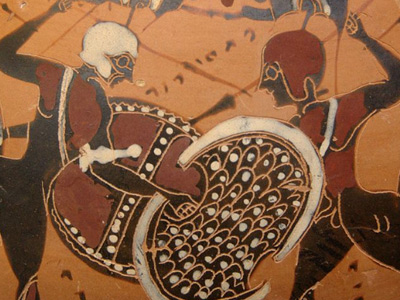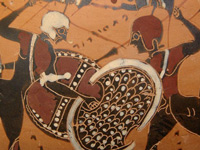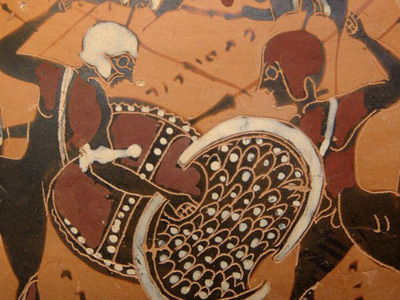First Peloponnesian War (460-445 BC)

Origins and Causes
A mere twenty years before the First Peloponnesian War broke out, Athens and Spartans had fought alongside each other in the Greco-Persian Wars. In that war, Sparta had held the hegemony of what modern scholars call the Hellenic League and the overall command in the crucial victories of 480 and 479 BC. Over the next several years, however, Spartan leadership bred resentment among the Greek naval powers that took the lead in carrying the war against Persian territories in Asia and the Aegean, and after 478 BC the Spartans abandoned their leadership of this campaign. Sparta grew wary of Athens' strength after they had fought alongside each other to disperse the Persians from their lands. When Athens started to rebuild its walls and the strength of its naval power, Sparta and its allies began to fear that Athens was becoming too powerful. Different policies made it difficult for Athens and Sparta to avoid going to war, since Athens wanted to expand its territory and Sparta wanted to dismantle the Athenian democratic regime.
Athens, meanwhile, had been asserting itself on the international scene, and was eager to take the lead in the Aegean. The Athenians had already rebuilt their walls, against the express wishes of Sparta, and in 479 BC and 478 BC had taken a much more active role in the Aegean campaigning. In the winter of 479–478 BC they accepted the leadership of a new league, the Delian League, in a conference of Ionian and Aegean states at Delos. The Athenians rebuilt their walls in secret at the urging of Themistocles, who convinced the Athenians that this was the best way to protect themselves. Themistocles also delayed talks with Sparta for universal arms control by constantly finding issues with Sparta's proposals, stating that it would leave Athens vulnerable to Sparta's superior hoplites and superior fighting formation: the phalanx. After the completion of the walls Themistocles declared Athens independent of Spartan hegemony stating that Athens knew what was in its best interest and was now strong enough to defend itself. At this time, one of the first hints of animosity between Athens and Sparta emerged in an anecdote reported by Diodorus Siculus, who said that the Spartans in 475–474 BC considered reclaiming the hegemony of the campaign against Persia by force. Modern scholars, although uncertain of the dating and reliability of this story, have generally cited it as evidence of the existence, even at this early date, of a "war party" in Sparta.
For some time, however, friendly relations prevailed between Athens and Sparta. Themistocles, the Athenian of the period most associated with an anti-Spartan policy, was ostracised at some point in the early 470s BC, and was later forced to flee to Persia. In his place in Athens rose Cimon, who advocated a policy of cooperation between the two states. Cimon was Athens' proxenos at Sparta, and so fond was he of that city that he named one of his sons Lakedaemonios, meaning "Spartan". Still, hints of conflict emerged. Thucydides reports that in the mid 460s BC, Sparta actually decided to invade Attica during the Thasian rebellion, and was only prevented from doing so by an earthquake, which triggered a revolt among the helots. Perhaps it was this revolt that prevented Sparta from attacking Athens before the Athenian walls were completed even though with Sparta's superior hoplites and fighting techniques it could have easily conquered Athens.
It was that helot revolt which would eventually bring on the crisis that precipitated the war. Unable to quell the revolt themselves, the Spartans summoned all their allies to assist them, invoking the old Hellenic League ties. Athens responded to the call, sending out 4,000 men with Cimon at their head. However, something either in the behaviour or appearance of the Athenian force insulted the Spartans and they dismissed the Athenians, alone of all their allies. This action destroyed the political credibility of Cimon; he had already been under assault by his Athenian opponents led by Ephialtes, and shortly after this embarrassment he was ostracised. The demonstration of Spartan hostility was unmistakable, and when Athens responded, events spiralled rapidly into war. Athens concluded several alliances in quick succession: one with Thessaly, a powerful state in the north; one with Argos, Sparta's traditional enemy for centuries; and one with Megara, a former ally of Sparta's which was faring badly in a border war with Sparta's more powerful ally, Corinth. At about the same time, Athens settled the helots exiled after the defeat of their revolt at Naupactus on the Corinthian Gulf. By 460 BC, Athens found itself openly at war with Corinth and several other Peloponnesian states, and a larger war was clearly imminent.
HISTORY

RESOURCES
This article uses material from the Wikipedia article "First Peloponnesian War (460-445 BC)", which is released under the Creative Commons Attribution-Share-Alike License 3.0.
© Stories Preschool. All Rights Reserved.









